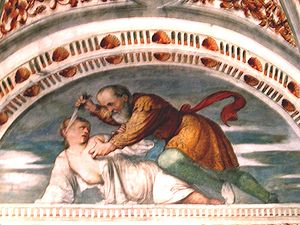
The Physician's Tale
Encyclopedia

The Canterbury Tales
The Canterbury Tales is a collection of stories written in Middle English by Geoffrey Chaucer at the end of the 14th century. The tales are told as part of a story-telling contest by a group of pilgrims as they travel together on a journey from Southwark to the shrine of Saint Thomas Becket at...
written by Geoffrey Chaucer
Geoffrey Chaucer
Geoffrey Chaucer , known as the Father of English literature, is widely considered the greatest English poet of the Middle Ages and was the first poet to have been buried in Poet's Corner of Westminster Abbey...
in the 14th century.
This is a domestic drama about the relationship between a daughter and her father and it is one of the earliest extant poems in English
English language
English is a West Germanic language that arose in the Anglo-Saxon kingdoms of England and spread into what was to become south-east Scotland under the influence of the Anglian medieval kingdom of Northumbria...
about such subjects and relationships. The tale comes from the Histories
Ab Urbe condita (book)
Ab urbe condita libri — often shortened to Ab urbe condita — is a monumental history of ancient Rome written in Latin sometime between 27 and 25 BC by the historian Titus Livius. The work covers the time from the stories of Aeneas, the earliest legendary period from before the city's founding in c....
of Titus Livius and is retold in The Romance of the Rose, John Gower
John Gower
John Gower was an English poet, a contemporary of William Langland and a personal friend of Geoffrey Chaucer. He is remembered primarily for three major works, the Mirroir de l'Omme, Vox Clamantis, and Confessio Amantis, three long poems written in French, Latin, and English respectively, which...
's Confessio Amantis
Confessio Amantis
Confessio Amantis is a 33,000-line Middle English poem by John Gower, which uses the confession made by an ageing lover to the chaplain of Venus as a frame story for a collection of shorter narrative poems. According to its prologue, it was composed at the request of Richard II...
which Chaucer drew on for inspiration along with the biblical story of Jephtha
Jephtha
Jephthah is a character in the Old Testament's Book of Judges, serving as a judge over Israel for a period of six years . He lived in Gilead and was a member of the Tribe of Manasseh. His father's name was also Gilead...
. Most of the other versions of the story focused on the cruel and arbitrary officials but Chaucer was far more concerned with the daughter as the central figure.
Virginius, a nobleman of Rome
Rome
Rome is the capital of Italy and the country's largest and most populated city and comune, with over 2.7 million residents in . The city is located in the central-western portion of the Italian Peninsula, on the Tiber River within the Lazio region of Italy.Rome's history spans two and a half...
, has a beautiful, fourteen year old daughter Virginia
Verginia
Verginia, or Virginia, was the subject of a story of Ancient Rome, related in Livy's Ab Urbe Condita.The people of Rome were already angry with the decemviri for not calling the proper elections, taking bribes, and other abuses. It seemed that they were returning to the rule of the Kings of Rome...
. She is spotted one day by a judge, Appius
Appius Claudius Crassus
Appius Claudius Crassus was a decemvir of the Roman Republic ca 451 BC.His father was Appius Claudius Sabinus, Consul in 471 BCE...
, who decides he must have her and forms a plan. His accomplice, a "churl" by the name of Claudius, claims in court that Virginia is his run-away slave and Appius decrees that her real father must relinquish her to the court. Virginius goes home and tells his daughter he must kill her to protect her honour and when she seemingly resigns herself to her fate and swoons, he cuts her head off. He takes her head to the court and when Appius demands his execution for murder the populace rises up and instead deposes the corrupt official. Appius kills himself in jail, but Virginius spares Claudius' life and condemns him into exile instead.
Although difficult to date like most of Chaucer's tales, the Physician’s tale is usually regarded as an early work of Chaucer probably written before much of the rest of the Canterbury Tales was begun. The long, and rather distracting, digression on governesses possibly alludes to a historical event and may serve to date it. In 1386 Elizabeth, the daughter of John of Gaunt, eloped to France with John Hastings, 3rd Earl of Pembroke
John Hastings, 3rd Earl of Pembroke
John Hastings, 3rd Earl of Pembroke was the son of John Hastings, 2nd Earl of Pembroke and Anne Manny, 2nd Baroness Manny...
. The governess of Elizabeth was Katherine Swynford
Katherine Swynford
Katherine Swynford, Duchess of Lancaster , née Roet , was the daughter of Sir Payne Roet , originally a Flemish herald from County of Hainaut, later...
who was also Gaunt's mistress and later wife. Chaucer's very careful, mollifying words on the difficult job and the virtues of governesses seem to be a very canny political move.
The story is considered one of the moral tales, along with the Parson's tale and the Knight's
The Knight's Tale
"The Knight's Tale" is the first tale from Geoffrey Chaucer's The Canterbury Tales. The story introduces many typical aspects of knighthood such as courtly love and ethical dilemmas. The story is written in iambic pentameter end-rhymed couplets.-Story:...
tale. However, the fate of Virginius renders questionable the moral assertion at the story's end. The Host enjoys the tale and feels for the daughter but asks the Pardoner for a more merry tale. The Pardoner obliges and his tale has a similar but contrasting moral message.

